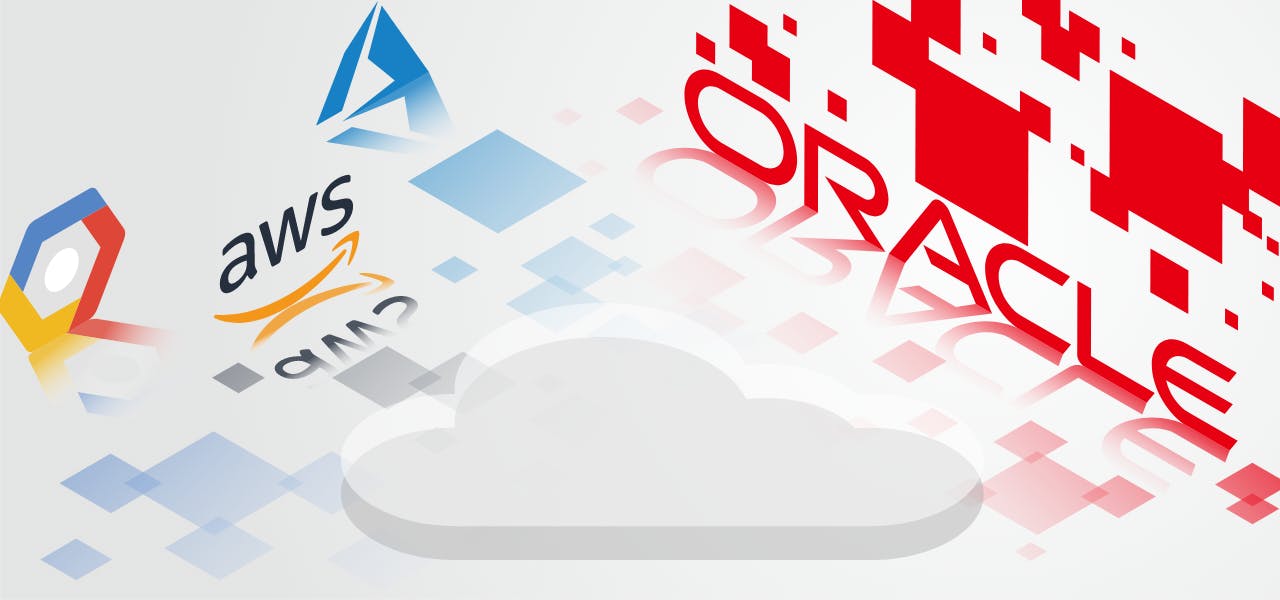Oracle Cloud Platform: The Underdog Making Big Moves

The US cloud computing market is more competitive than ever. At the top of the food chain is AWS, with Microsoft Azure and Google Cloud rounding out the top three.
As companies migrate to the cloud in record numbers, the top cloud providers are constantly jockeying to gain market share, racking up new contracts. Google Cloud’s CEO has made it his stated goal for Google to move into at least second place within the next five years.
While the big three continue to fight for market share, Oracle has been turning heads with some big wins, taking business from its biggest competitors. What sets Oracle apart? Why are companies increasingly looking at the underdog?
Oracle Advantages
Oracle has a number of advantages that are frequently touted when comparing it to its bigger rivals.
Cost
One of the biggest advantages that is consistently mentioned is cost. Compared to its rivals, Oracle’s pricing often allows its customers to scale faster and cheaper than with rival platforms.
Communication company 8x8 is one of those that moved from AWS to Oracle. As the pandemic forced companies to migrate online, 8x8 found itself trying to deal with a massive growth spike.
“As video meetings quickly became the connective tissue of today’s new world, we saw our user count soar. To support that exponential growth, we looked at several platforms and chose Oracle’s Gen 2 Cloud infrastructure for its strong security, outstanding price/performance, and world-class support to serve this new surge of users,” said 8x8 CEO Vik Verma.
Ultimately, moving to Oracle saved the company “more than 80 percent on the cost of outbound or exported data compared to AWS.”
Performance
From the beginning, Oracle’s cloud platform was designed for performance. One of its major benefits is a “flat network design [that] limits the number of network hops between compute and storage to a maximum of two. Combined with no network or CPU over-subscription, and locally attached NVMe storage, you get a low-latency network with predictable performance and fast cloud storage.”
Security
Another area where Oracle often has the advantage is in the realm of security. Oracle has been providing enterprise services for decades. As a result, its approach to security is driven and informed by that experience. This often results in methodologies that make it inherently easier to move forward as securely as possible.
That’s not to say that AWS, Azure or Google Cloud don’t have good security. In some cases, however, their approach emphasizes getting up-and-running as quickly as possible, making it more likely for security vulnerabilities to creep in.
Security was one of the driving factor’s in Zoom’s decision when considering options for its cloud infrastructure expansion. Zoom quickly established itself as the go-to video communication platform for remote work and online learning during the COVID-19 pandemic. Like 8x8, it saw a meteoric rise in its user base, forcing it to rapidly scale its infrastructure. What’s more, early missteps forced the company to carefully weigh the security of whatever option it chose. While the company continues to use AWS and Microsoft, it chose Oracle for its latest expansion.
“We recently experienced the most significant growth our business has ever seen, requiring massive increases in our service capacity. We explored multiple platforms, and Oracle Cloud Infrastructure was instrumental in helping us quickly scale our capacity and meet the needs of our new users,” said Zoom CEO Eric S. Yuan. “We chose Oracle Cloud Infrastructure because of its industry-leading security, outstanding performance, and unmatched level of support.”
Integration
Another benefit of Oracle’s cloud platform is its integration with Oracle’s existing services. Many cloud providers use a plethora of third-party services, frameworks and resources. Oracle, on the other hand, offers a full-stack, well-integrated solution, including database, middleware and apps.
This relates closely to the first benefit: cost. The less third-party tools, frameworks and services that need to be cobbled together, the less cost the client company incurs.
Scalability
One of the challenges many companies face is scaling services as needed. This is another area where Oracle’s enterprise experience comes to bear. Scalability was another of the main reasons why Zoom chose Oracle, and is one of its biggest strengths.
Simplicity
Another benefit to Oracle’s approach is simplicity. Because of the integration it provides, as well as its long history in the enterprise, Oracle is well-known for providing unrivaled simplicity. Whether it be migrating data and systems to the cloud, or ongoing maintenance and optimization, Oracle provides a simplicity that is hard for some of its competitors to match.
Oracle: A Rising Star
Without a doubt, Oracle is gaining ground in the cloud market. It continues to make headlines with high-profile contracts, some of which have resulted in taking customers away from its larger competitors.
When taken together, Oracle’s experience in the enterprise market creates a compelling set of advantages, including security, integration, cost, simplicity and scalability.
Related Articles

The US cloud computing market is more competitive than ever. At the top of the food chain is AWS, with Microsoft Azure and Google Cloud rounding out the top three.
As companies migrate to the cloud in record numbers, the top cloud providers are constantly jockeying to gain market share, racking up new contracts. Google Cloud’s CEO has made it his stated goal for Google to move into at least second place within the next five years.
While the big three continue to fight for market share, Oracle has been turning heads with some big wins, taking business from its biggest competitors. What sets Oracle apart? Why are companies increasingly looking at the underdog?
Oracle Advantages
Oracle has a number of advantages that are frequently touted when comparing it to its bigger rivals.
Cost
One of the biggest advantages that is consistently mentioned is cost. Compared to its rivals, Oracle’s pricing often allows its customers to scale faster and cheaper than with rival platforms.
Communication company 8x8 is one of those that moved from AWS to Oracle. As the pandemic forced companies to migrate online, 8x8 found itself trying to deal with a massive growth spike.
“As video meetings quickly became the connective tissue of today’s new world, we saw our user count soar. To support that exponential growth, we looked at several platforms and chose Oracle’s Gen 2 Cloud infrastructure for its strong security, outstanding price/performance, and world-class support to serve this new surge of users,” said 8x8 CEO Vik Verma.
Ultimately, moving to Oracle saved the company “more than 80 percent on the cost of outbound or exported data compared to AWS.”
Performance
From the beginning, Oracle’s cloud platform was designed for performance. One of its major benefits is a “flat network design [that] limits the number of network hops between compute and storage to a maximum of two. Combined with no network or CPU over-subscription, and locally attached NVMe storage, you get a low-latency network with predictable performance and fast cloud storage.”
Security
Another area where Oracle often has the advantage is in the realm of security. Oracle has been providing enterprise services for decades. As a result, its approach to security is driven and informed by that experience. This often results in methodologies that make it inherently easier to move forward as securely as possible.
That’s not to say that AWS, Azure or Google Cloud don’t have good security. In some cases, however, their approach emphasizes getting up-and-running as quickly as possible, making it more likely for security vulnerabilities to creep in.
Security was one of the driving factor’s in Zoom’s decision when considering options for its cloud infrastructure expansion. Zoom quickly established itself as the go-to video communication platform for remote work and online learning during the COVID-19 pandemic. Like 8x8, it saw a meteoric rise in its user base, forcing it to rapidly scale its infrastructure. What’s more, early missteps forced the company to carefully weigh the security of whatever option it chose. While the company continues to use AWS and Microsoft, it chose Oracle for its latest expansion.
“We recently experienced the most significant growth our business has ever seen, requiring massive increases in our service capacity. We explored multiple platforms, and Oracle Cloud Infrastructure was instrumental in helping us quickly scale our capacity and meet the needs of our new users,” said Zoom CEO Eric S. Yuan. “We chose Oracle Cloud Infrastructure because of its industry-leading security, outstanding performance, and unmatched level of support.”
Integration
Another benefit of Oracle’s cloud platform is its integration with Oracle’s existing services. Many cloud providers use a plethora of third-party services, frameworks and resources. Oracle, on the other hand, offers a full-stack, well-integrated solution, including database, middleware and apps.
This relates closely to the first benefit: cost. The less third-party tools, frameworks and services that need to be cobbled together, the less cost the client company incurs.
Scalability
One of the challenges many companies face is scaling services as needed. This is another area where Oracle’s enterprise experience comes to bear. Scalability was another of the main reasons why Zoom chose Oracle, and is one of its biggest strengths.
Simplicity
Another benefit to Oracle’s approach is simplicity. Because of the integration it provides, as well as its long history in the enterprise, Oracle is well-known for providing unrivaled simplicity. Whether it be migrating data and systems to the cloud, or ongoing maintenance and optimization, Oracle provides a simplicity that is hard for some of its competitors to match.
Oracle: A Rising Star
Without a doubt, Oracle is gaining ground in the cloud market. It continues to make headlines with high-profile contracts, some of which have resulted in taking customers away from its larger competitors.
When taken together, Oracle’s experience in the enterprise market creates a compelling set of advantages, including security, integration, cost, simplicity and scalability.
Related Articles
